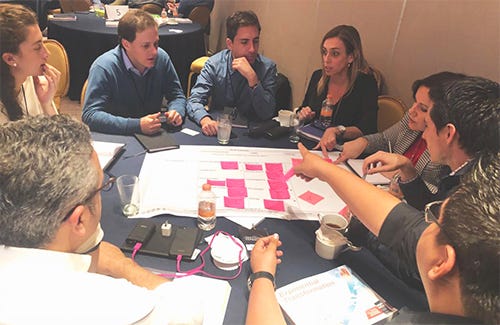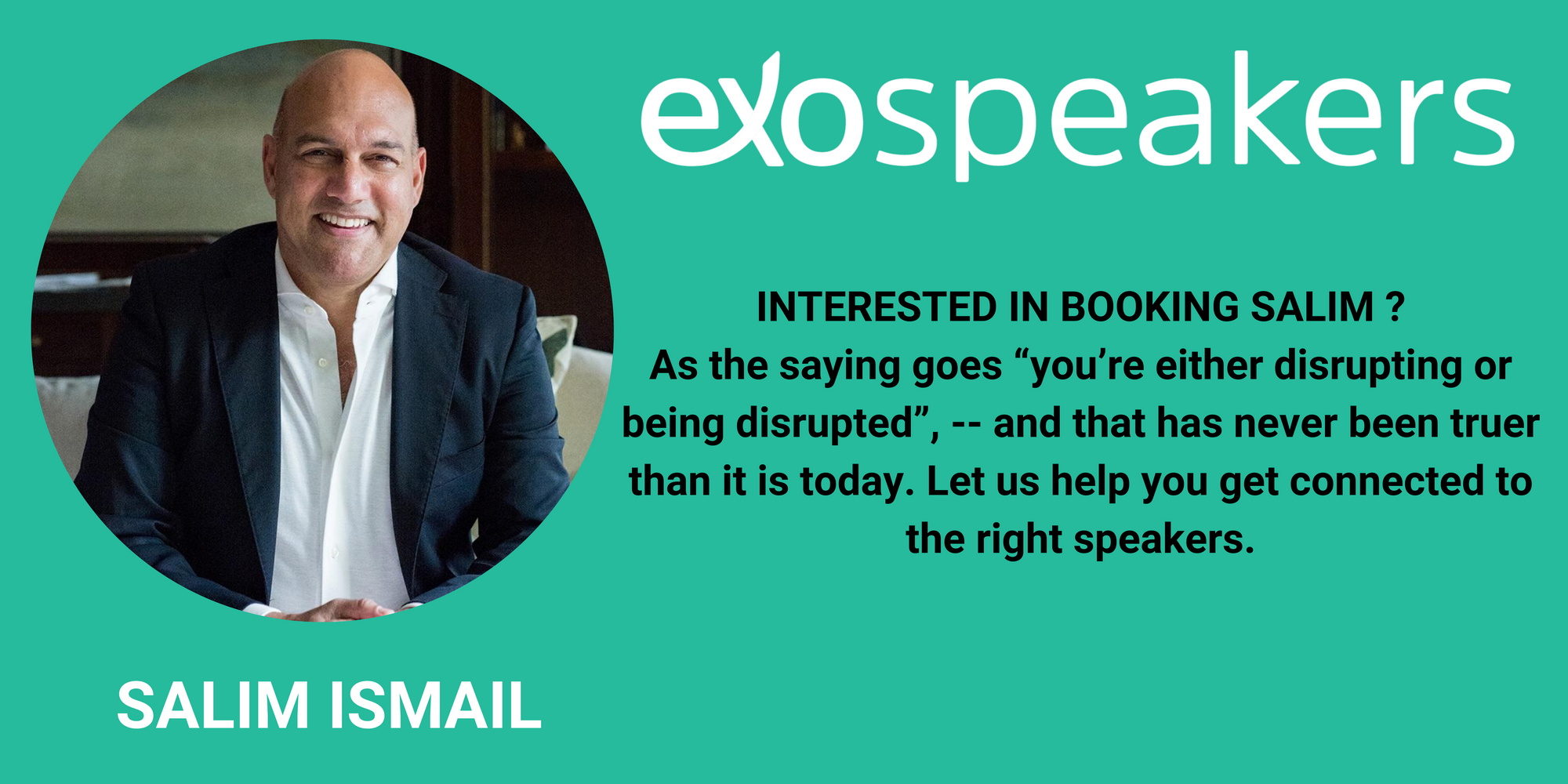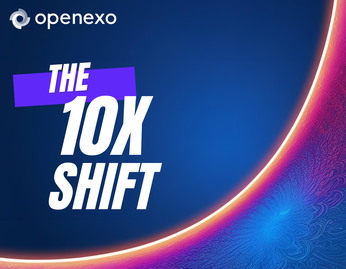
Forget Startups, ExOs (Exponential Organizations) Are The New Way To Innovate
When you lower the cost of supply, you decrease the denominator and your market cap explodes. This is one of the reasons why there are so many unicorns these days.
Nothing lasts forever and the startup era is no exception. Exponential Organizations (ExOs) are a new breed of organizations disrupting entire industries by scaling as fast as exponential technologies do. In addition, the ExO model is the framework that finally allows both entrepreneurs and corporations to speak the same language and disrupt industries together.
A brief history on technology startups
In the late 90s, the emergence of the Internet brought new opportunities to most existing industries and created vast new markets. As a result, a new type of business peaked in that decade: the technology startup.
These startups took advantage of digital technologies to tackle existing markets in innovative ways. They took on a high level of risk but also were looking at a huge opportunity to build highly profitable and scalable businesses.
As the number of startup ventures increased, successful entrepreneurs began to share their experience and knowledge to help other entrepreneurs build their own new startups and reduce the risk of doing so by applying a set of strategies, principles, tools, and processes. Some of these were Design Thinking, Blue Ocean Strategy, and Crossing the Chasm. However, the most impactful was the Lean Startup, which created its own global movement.
One of the fathers of the Lean Startup movement was Steve Blank who wrote The Four Steps to the Epiphany in which he described his Customer Development process. Blank defined a startup as: a temporary organization used to search for a repeatable and scalable business model.
A second key contributor to the lean movement was Eric Ries, who wrote the bestseller The Lean Startup. In it, he defined the famous Build-Measure-Learn process. Ries defined a startup as: a human institution designed to deliver a new product or service under conditions of extreme uncertainty. This uncertainty, according to Ries, was caused by the new digital context in which startups had to operate — that is, there were no established companies to follow. He considered any new business idea simply as a hypothesis to be evaluated in order to reduce uncertainty.
The final major contributor to the lean startup movement was Alex Osterwalder. In his Business Model Generation, he presented the Business Model Canvas — a simple tool to visualize, communicate and iterate business hypotheses.

Photo by Ross Findon on Unsplash
The new age of Exponential Organizations (ExOs)
In the 15th century, Johannes Gutenberg invented the printing press which irrevocably changed public access to knowledge and the ability to share ideas. This invention changed the world and is referred to as The Gutenberg Moment. Today, Salim Ismail maintains that fully 20 such Gutenberg Moments are hitting us simultaneously, powered by computing, telecommunications, and other accelerating technologies — including Artificial Intelligence, 3D printing, drones, genetics, robotics, and more.
The World Economic Forum has called the current period we are living in The Fourth Industrial Revolution, as digital technologies are now changing at a faster pace than ever due to their exponential nature.

Photo by Giu Vicente on Unsplash
As Peter Diamandis and Steven Kotler describe in Abundance, the rise of exponential technologies is generating an abundance of everything. Today it is possible to access the world’s information on the Internet, take unlimited photographs, and stream videos globally at a near-zero cost. Very soon we will have an abundance of water through new extraction technologies. Solar energy technology, which is doubling every 22 months, will be able to supply 100 percent of current energy usage by 2030. Free energy will in turn facilitate hundreds of other new technologies to achieve abundance, such as more efficient desalination.
This new abundance-based context is already threatening existing business models, which are largely based on scarcity. What happens when revenues, based on selling a commodity that was scarce, suddenly find that commodity abundant? Ask the music industry — eight major music studios selling scarcity gave way to essentially two platforms (iTunes and Spotify) offering abundance.
The good news is that these exponential technologies also provide new opportunities to everyone. Peter Diamandis describes the chain reaction that takes place as the “Six Ds” — Digitized, Deceptive, Disruptive, Demonetized, Dematerialized, and Democratized.
In the early stages at least, as products and services become digitized, they can be deceptive as their growth appears to happen very slowly. However due to their exponential nature, at a certain tipping point, they skyrocket — becoming radically disruptive to industries. In the process, physical products become dematerialized and thus demonetized. This in turn leads to them being democratized as greater audiences gain access to technology. And the cycle repeats.
When breakthroughs become democratized and available to everyone, entrepreneurs and organizations globally are able to use the new exponential technologies and make a difference in the world. A recent example of this was put into action in a Vietnamese fishing village. To save rising diesel fuel costs, some villagers got together and literally created a solar-powered boat by laying solar panels on their boat roofs.
However, it is not just about technology. Studies — such as Achieve Consulting’s “Millennial Impact Report” and Deloitte’s “Millennial Survey” suggest that younger generations are increasingly dissatisfied with professional careers that don’t create a positive impact in the world. As society as a whole moves up Maslow’s hierarchy of needs, self-fulfillment, and doing something that positively impacts the world moves to the fore.
Similarly, organizations are also becoming more and more focused on their impact. We are seeing the rise of a new class of businesses focused on making a positive impact on the world instead of just making money. Our global grand challenges are also the biggest market opportunities in the world and we are seeing a shift — from investors and customers alike — towards mission-based organizations.
This new emergent class of businesses is being called Exponential Organizations or ExOs. ExOs are purpose-driven entities that leverage new exponential technologies and a set of common organizational attributes that allow them to tap into and manage abundance to scale exponentially as technology does. In the bestseller Exponential Organizations, we explained why this new type of entity is arising now (and could not have happened before). The book was the result of more than four years of research trying to understand and model this new phenomenon called ExO.
One key outcome we uncovered is the key economic thesis for ExOs. Every business tries to manage the costs of supply and demand. The Internet, for the first time in history, allowed startups to drop the cost of demand exponentially via online marketing, referral marketing, and the holy grail of a viral loop. ExOs scale by exponentially dropping the marginal cost of supply. Airbnb’s marginal cost of adding a hotel room is almost zero, whereas a hotel chain has to build a whole new hotel. This happens similarly with Uber or Wikipedia or thousands of other such ExOs. We have never seen this before in business. When you lower the cost of supply, you decrease the denominator and your market cap explodes. This is one of the reasons why there are so many unicorns these days. A startup that has essentially no marginal cost of supply is an existential threat to an incumbent.

ExO Attributes
In addition to leveraging accelerating technologies, ExOs have a Massive, Transformative Purpose (MTP) and ten organizational attributes in common. Five are external characteristics: Staff on Demand, Community and Crowd, Leveraged Assets, Algorithms & Engagement (condensing to the acronym SCALE) and five are internal mechanisms (Interfaces, Dashboards, Experimentation, Autonomy and Social Technologies (which shrink to IDEAS). These three components, MTP, SCALE and IDEAS make up an ExO.
Importantly, ExOs are not something we invented but an already existing phenomenon that we identified and labeled. Here are some examples:
- Google, whose MTP is “Organize the world’s information” taps into the abundance of information and making it accessible to users worldwide. Google makes strong use of the ExO Attributes leveraged assets, algorithms, engagement, and interfaces.
- Xiaomi, the Chinese smartphone company, taps into a community of super-users and thus has no marketing or product development costs (the community votes on new features)
- Airbnb, whose MTP is “Belong Anywhere”, is tapping into an abundance of extra bedrooms and making those available to travelers worldwide. Airbnb makes strong use of the ExO Attributes community, leveraged assets, engagement and social technologies.
- Github, whose MTP is “Social Coding”, taps into an abundance of software code for developers worldwide. Github leverages all 10 attributes.
It is also important to note that Exponential Organizations and Startups are not the same — there are three primary differences:
- ExOs are purpose-oriented, as they do not focus only on money but also on making the world a better place. ExOs have an MTP (Massive Transformative Purpose), a vision, and a mission; while startups only have the last two elements.
- ExOs apply a minimum of four out of 10 of the ExO Attributes. ExOs are not only focused on business but also on tapping into abundance to exponentially scale. In terms of tools, this means that ExOs do not only use the Business Model Canvas, but they combine it with the ExO Canvas (explained below), and an early stage ExO typically uses all the attributes.
- An ExO is a permanent state, while a startup is a temporary state. We usually say that we “build Exponential Organizations” since creating an ExO is the objective from the beginning, while we “launch startups”, as a startup is just the initial stage of a business that we are eventually trying to scale.
The ExO approach can be used by new organizations launched from scratch in order to become Exponential Organizations or by existing ones that want to transform to become one. To quantify the ExO Model, our community created a diagnostic survey called the Exponential Quotient (ExQ) which measures the flexibility and adaptability of an organization as measured by their use of an MTP and attributes. Here is a list of the top 100 ExOs that were found and a list of the Fortune 100, ranked by their ExQ a few years ago. If you analyze these lists you’ll see that if you had invested in the top 10 most exponential corporations on our ExQ Fortune 100 ranking, you would have outperformed the S&P 500 by almost three times. Validated with measurable proof of the model we felt confident in sharing the ExQ as a guide to help others assess their own organization.
As the external world becomes more volatile, your ability to adapt will drive market performance. The ExQ provides a way for you to measure your organization’s flexibility and accelerate a path to becoming exponential. Over the last few years, many incubators and accelerators like Rokk3r Labs in Miami, have incorporated the ExQ Survey as part of their application entry forms. As CEO Nabyl Charania of Rokk3r says, “we see it as an invaluable guide to see how the entrepreneur is thinking about their business”.
Now, the question is…
Are you still following an old model to build your business or do you want to join this rising wave of Exponential Organizations?
The ExO Movement
The Lean Startup Movement emerged as successful entrepreneurs helped one another to iterate and fail less. A similar phenomenon is now happening with Exponential Organizations, as more and more new Exponential Organizations are continually being created.
Alongside ExO creation in the private sector, many educational institutions around the world like Singularity University, THNK, and Futur are inspiring entrepreneurs and executives to make better use of exponential technologies. In fact, the IE Business School in Spain has added the ExO Model to their curriculum to help students to learn how to build the businesses of the future by creating them; instead of studying past case studies, young entrepreneurs are creating new initiatives.
The community of exponential leaders is co-creating and sharing tools and processes to help others to build their own ExOs. Some of these are:
- The ExO Canvas, a crowdsourced initiative where more than 100 entrepreneurs and innovators around the world worked together in order to define a simple tool, similar to the Business Model Canvas, to describe Exponential Organizations and its usage of the ExO Attributes.

ExO Workshop in Mexico, 2018.
- The ExO Sprint, a 10-week process that any established business can follow in order to become an Exponential Organization. We have found that the program catapults leadership, culture and management thinking three years ahead in just 10 weeks. Also, the ExO Sprint process allows established organizations to collaborate with entrepreneurs and to build new ExOs together speaking the same language and avoiding the immune system problem that happens when existing startups and established organizations work together (or even worse, when you try to integrate them!).
- Exponential Transformation book, focused on how to apply the ExO Model by combining both the ExO Canvas and the ExO Sprint described above. The book brought together over 200 entrepreneurs and innovators globally who contributed to its development.
- The ExO Toolkit, a set of open source tools created by the community to assist entrepreneurs and innovators to build ExOs. This project was supported by the Gazelles Growth Institute, which has education programs on ExO in different languages.
Other initiatives are emerging, often either open or crowdsourced that work with ExO models and tools, such as:
- ExO Leader, a program focused on helping a new type of leader to use special skill sets and mindsets to lead Exponential Organizations.
- ExO Launchpad, a process to help entrepreneurs transform their idea or current startup into an Exponential Organization.
- Fastrack Institute, a non-profit helping public entities to apply the ExO Model and to leverage Exponential Organizations to benefit their environment.
We are amazed at the excitement and huge numbers of entrepreneurs and executives who are jumping into the ExO approach. This ExO Movement is bringing people from all around the world who want to make a positive impact by applying new technologies combined with organizational approaches. We believe this movement will transform the world for a better future and you can be a part of it.
Just like the 1990s when entrepreneurs stopped building traditional or linear businesses and started launching startups, we believe that 2019 is the inflection point where entrepreneurs stop launching startups and start building Exponential Organizations.
At the close of 2018, Github, the most exponential start-up we have ever seen, was purchased by Microsoft. As we mentioned earlier, Github embodies an exponential organization with an MTP and all 10 attributes of SCALE and IDEAS implemented. The purchase price? $7.5 billion for a company with no assets, no workforce and no intellectual property. GitHub is one of many ExOs today providing societal value in an economically successful way and adapting to an exponentially changing world. The ExO Model is the framework that gives you a leg up on understanding companies such as Github and allows both entrepreneurs and corporations to thrive and disrupt industries together.
If you are not using the ExO Model for your existing or new venture, what are you waiting for?
This article was originally featured on the OpenExO blog on October 09, 2019

ExO Insight Newsletter
Join the newsletter to receive the latest updates in your inbox.









